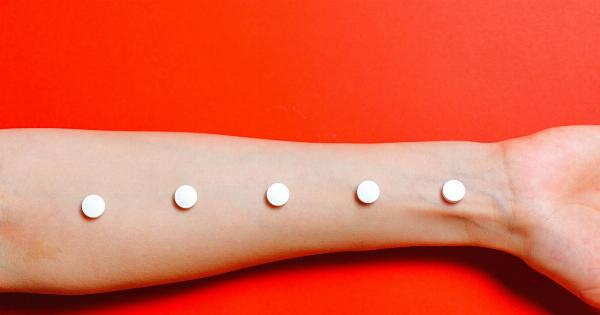Psoriasis and urticaria are two distinct skin conditions that affect millions of people worldwide.
Psoriasis is a chronic autoimmune disorder that causes red, scaly patches on the skin, while urticaria (also known as hives) is a reaction to an allergen that causes red, raised welts on the skin. Despite their differences, both of these conditions can be frustrating and uncomfortable for those who suffer from them. In this article, we’ll explore the causes, symptoms, and treatment options for both psoriasis and urticaria.
Psoriasis
Psoriasis is an autoimmune disorder that causes the body to produce skin cells at an accelerated rate. This results in the buildup of thick, scaly patches of skin that can be red, itchy, and painful.
Although the exact cause of psoriasis is unknown, genetic factors are believed to play a role. Other triggers that can cause or exacerbate psoriasis include:.
- Stress
- Infection
- Smoking
- Alcohol consumption
- Injury to the skin
- Sunburn
There are several types of psoriasis, including plaque psoriasis, guttate psoriasis, and pustular psoriasis. Each type has its own characteristics and may require different treatment approaches.
Symptoms of Psoriasis
The symptoms of psoriasis can vary depending on the type of psoriasis a person has. Some of the most common symptoms include:.
- Red, raised patches of skin
- Silver or white scales on the patches
- Dry, cracked skin that may bleed
- Itching or burning sensations
- Thickened, pitted or ridged nails
- Joint pain or stiffness
Treatment for Psoriasis
There is no cure for psoriasis, but treatment can help manage the symptoms. Treatment options may include:.
- Topical creams and ointments, such as corticosteroids or vitamin D analogues
- Light therapy, which involves exposing the affected skin to ultraviolet light
- Oral medications, such as methotrexate or cyclosporine
- Biologic medications, such as etanercept or adalimumab
Lifestyle changes can also help manage the symptoms of psoriasis. Some of these changes include quitting smoking, reducing alcohol consumption, and avoiding triggers such as stress and sunburn.
Urticaria
Urticaria, also known as hives, is a skin condition that causes red, raised welts on the skin. The welts can be small or large and may appear in clusters.
Urticaria is usually caused by an allergic reaction to a substance, such as food, medication, or insect bites. Stress, infection, and exposure to extreme temperatures can also trigger urticaria in some people.
Symptoms of Urticaria
The symptoms of urticaria include:.
- Red, raised welts on the skin
- Itching or burning sensations
- Swelling of the lips, eyes, or throat
- Difficulty breathing
- Dizziness or fainting
Treatment for Urticaria
Mild cases of urticaria may resolve on their own without treatment. However, if the symptoms are severe or persistent, treatment may be necessary. Treatment options may include:.
- Antihistamine medications, which block the effects of histamine and reduce itching and swelling
- Corticosteroid medications, which reduce inflammation and itching
- Epinephrine injections, which are used in severe cases of urticaria to open the airways and increase blood pressure
Identifying and avoiding the triggering substance is also an important part of managing urticaria. Your doctor may also recommend keeping a diary of your symptoms to help identify triggers.
Conclusion
Psoriasis and urticaria are two distinct skin conditions that can be frustrating and uncomfortable for those who suffer from them.
If you suspect that you have psoriasis or urticaria, it’s important to see a dermatologist for an accurate diagnosis and treatment plan. While there is no cure for either condition, treatment options are available to help manage the symptoms and improve quality of life.


























